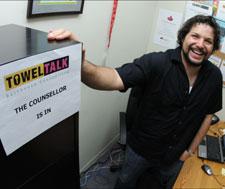“I am fully dressed. I don’t wear a towel,” says Marco Posadas, program coordinator and “bathhouse counsellor” for the Towel Talk program.
Launched in January the yearlong pilot program, which puts Posadas into four of the city’s bathhouses on a regular basis to offer professional counselling, is the first of its kind in Canada.
“It’s just like Lucy in the old Peanuts comics — the counsellor is in,” says Posadas, holding up the sign he takes with him to the various bathhouses. “This is the same thing, except I’m hairier than Lucy.”
Posadas sets up shop twice a month for three to four hours at a time at Steamworks, Spa Excess, St Marc Spa and Central Spa. “Most of the bathhouses already have a clinic or outreach room so that’s the same room where I do my counselling,” he says.
Posadas says the goal is to let bathhouse patrons know the service is available without being obtrusive. Upon entrance customers are handed small info cards notifying them that a counsellor is available. Other than that and the occasional announcement made over the PA system customers don’t even notice that he is there, says Posadas.
“I’m only there if you need to talk to someone,” he says. “We’re subtle enough so that you can ignore us if you want to.”
Funded by the Ontario Ministry of Health and Long-term Care’s AIDS Bureau and housed at the AIDS Committee of Toronto (ACT), Towel Talk was inspired by a program that operates in Steamworks locations south of the border. The chain’s Mr Sexx program operates in the company’s Chicago, Illinois and Berkeley, Calfornia bathhouses.
“If you want to help people, sometimes you have to reach people inside the club — catching them when they are in the right state of mind to talk,” says Nirmalpal Sachdev, Steamworks’ director of health information and education programs and general manager of the bathhouse chain’s Chicago location.
The initiative morphed into Towel Talk after Steamworks’ management approached the provincial AIDS Bureau about importing the program.
Posadas says that men who would otherwise be reluctant to seek out professional counselling or who are turned off by long waiting lists have stopped to talk to him during his Towel Talk sessions and that although many do want to talk about sex, there are a whole host of other issues guys want to discuss including body image, self-esteem, rejection, drugs, feelings of guilt and shame, stress and even immigration.
“I’ve already had sessions in Spanish because many immigrants go to the bathhouse as a way of accessing the community,” says Posadas, a native of Mexico. “I have at least one conversation per shift in Spanish.”
All told Posadas says he has about 15 conversations per three-hour shift, with two to three of those leading to a counselling session — held right there in a private area of the bathhouse — lasting anywhere from 10 minutes to 45 minutes. If need be the client can then continue seeing Posadas at his office at ACT or be referred to other agencies.
Peter Bochove, coowner of Spa Excess, praises the program because it goes beyond the usual safer sex education.
“It’s not enough to tell someone to wear a condom,” says Bochove. “Sometimes people need to talk. Bathhouses must be part of the solution, not part of the problem and the safety of our customers must come first.”
For now Posadas is the program’s only counsellor, but he hopes to hire a second counsellor in time for Pride season.
“The goal is to be in all four bathhouses on a weekly basis,” says Posadas.
“I’ve discovered that while there’s a big population of guys who go to bathhouses to fuck many also go there just to connect,” says Posadas. “For some it’s their only outlet for community so bathhouses provide more than just a place to have casual anonymous sex.”

 Why you can trust Xtra
Why you can trust Xtra


